|
|
|
Sort Order |
|
|
|
Items / Page
|
|
|
|
|
|
|
| Srl | Item |
| 1 |
ID:
126761
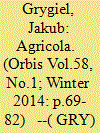

|
|
|
|
|
| Publication |
2013.
|
| Summary/Abstract |
Gnaeus Julius Agricola (40-93 AD) is a man for our times. Facing the capriciousness of imperial power, he, a successful provincial Roman governor, chose to withdraw from public administration. Yet, by protecting his family, Agricola did not shirk politics. On the contrary, he retreated to the founding cell of any polity, the family, which buttresses and at the same time limits the state. By doing so, Agricola reached greatness despite living under bad emperors.
|
|
|
|
|
|
|
|
|
|
|
|
|
|
|
|
| 2 |
ID:
126774
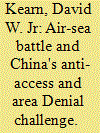

|
|
|
|
|
| Publication |
2013.
|
| Summary/Abstract |
The challenge presented by china's military modernization has seemingly altered the conventional balance in the western pacific, with significant implications for U.S. national security policy, and, thus, deserves the focus of planners and decision-makers.
|
|
|
|
|
|
|
|
|
|
|
|
|
|
|
|
| 3 |
ID:
126759


|
|
|
|
|
| Publication |
2013.
|
| Summary/Abstract |
This article lays out the case for why Washington's European allies are incapable, both now and in the foreseeable future, of replacing American military leadership. Despite recent substantial force contributions in Iraq and Afghanistan and small-scale interventions in Africa, European military capabilities are limited, declining, and unlikely to rebound, regardless of whether the United States is in strategic retreat. As a result, the United States faces a bleak choice: not whether to trade American global leadership for an equally benevolent European world order, but whether to give up its mantle of leadership and thereby create a void that may be filled by unfriendly, if not overtly hostile, actors.
|
|
|
|
|
|
|
|
|
|
|
|
|
|
|
|
| 4 |
ID:
126770
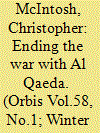

|
|
|
|
|
| Publication |
2013.
|
| Summary/Abstract |
As long as we conceive of the fight with al qaeda as a war, the fight will remain unwinnable and the goal of effective destruction will remain beyond our reach, according to the author. Historically speaking, modern wars require negotiated conclusions or the complete eradication of present and future threats. The former is politically impossible and the latter is historically unachievable.
|
|
|
|
|
|
|
|
|
|
|
|
|
|
|
|
| 5 |
ID:
126760
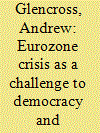

|
|
|
|
|
| Publication |
2013.
|
| Summary/Abstract |
This article explores how both the sovereign debt crisis and the European Union's response illustrate fundamental characteristics of contemporary European integration. In the face of an unexpected emergency, national politicians took the lead and pressed ahead with more integration. The long-term results though depend on national acceptance of not just the bailout provisions but also enforcement of debt brakes mandated by the new EU treaty. This means democratic politics at the national level will continue to have a fundamental influence on EU affairs, while the North/South split will co-exist alongside a more marked separation between countries inside and outside the Eurozone. In this context of increased political turbulence within the EU, there is likely to be only a limited window of opportunity for successful negotiation of a free-trade deal with the United States.
|
|
|
|
|
|
|
|
|
|
|
|
|
|
|
|
| 6 |
ID:
126752
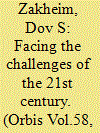

|
|
|
|
|
| Publication |
2013.
|
| Summary/Abstract |
America's strategy has become increasingly budget-driven in the face of ongoing cuts, culminating in the sequester. As a result, fewer funds are, and will be, available for critical operations, notably exercises and training with foreign forces that are the key both to strengthening alliances and partnerships and to deterring current and potential adversaries. That Washington continues to revise its defense strategy virtually on an annual basis has further undermined its credibility worldwide. Given its long-standing global interests, and uncertainty regarding when and where it might again have to commit forces to defend them, the United States must reinvigorate its efforts to streamline the Defense Department so as to maintain its global posture in the face of budget pressures. Measures to improve defense efficiency include reductions in the civilian and contractor work forces, overhaul of the military medical and retirement systems, and repeal of anachronistic laws that foster waste in defense acquisition.
|
|
|
|
|
|
|
|
|
|
|
|
|
|
|
|
| 7 |
ID:
126773
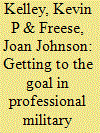

|
|
|
|
|
| Publication |
2013.
|
| Summary/Abstract |
Professional military education (PME) has been under fire from a broad range of critics for a variety of reasons, including credibility, intellectual rigor and administrative mismanagement. But pme provides an invaluable learning and growth experience to those beyond the select few of america's fighting forces who attend elite civilian graduate programs. The practitioner and security oriented curriculum, and inter-service and civilian mix of seminar students, is not available elsewhere. Therefore, PME must be fixed, not abandoned as some have suggested. A first step in fixing the problem is to identify gaps between what is intended by congress and military leadership and what is being executed. This article proposes and outlines a study to identify those gaps.
|
|
|
|
|
|
|
|
|
|
|
|
|
|
|
|
| 8 |
ID:
126766


|
|
|
|
|
| Publication |
2013.
|
| Summary/Abstract |
The adage that "it is always easier to fight the last war" is one that readily can be applied to the United States and its armed forces for not predicting the scale and type of operations encountered in the occupations of Iraq and Afghanistan. This article argues that the lack of preparation in the post-invasion phases arose from an institutional attachment to a preferred paradigm of warfare, as exemplified by the Persian Gulf War of 1991. This paradigm, though, has been substantially resurrected and re-configured to suit the fighting preferences of the American armed forces in its protracted encounters in Iraq and Afghanistan. Far from re-orienting its organization and mindset to meet the challenges of so-called counterinsurgency campaigns, as much current advocacy maintains, the military has reverted to the form of warfare it knows best.
|
|
|
|
|
|
|
|
|
|
|
|
|
|
|
|
| 9 |
ID:
126758


|
|
|
|
|
| Publication |
2013.
|
| Summary/Abstract |
According to the honest broker model, when national security advisors press for specific policy outcomes, they compromise their ability to focus on improving the quality of the decision- making process. That model is tested here in the case of the 2006 Iraq Strategy Review. It found that national security advisor Stephen Hadley was able to act as honest broker, and that this did in fact improve the quality of the decision process. At the same time, he was able to act as a policy entrepreneur, connecting existing problems to alternative policy ideas. Consequently the two roles were not incompatible. Moreover, he was able to do both primarily because he acted as a credible agent of the president. The implication is that the national security advisor must be first and foremost an effective presidential agent, if he or she is to play any constructive role-including that of honest broker.
|
|
|
|
|
|
|
|
|
|
|
|
|
|
|
|
|
|
|
|
|